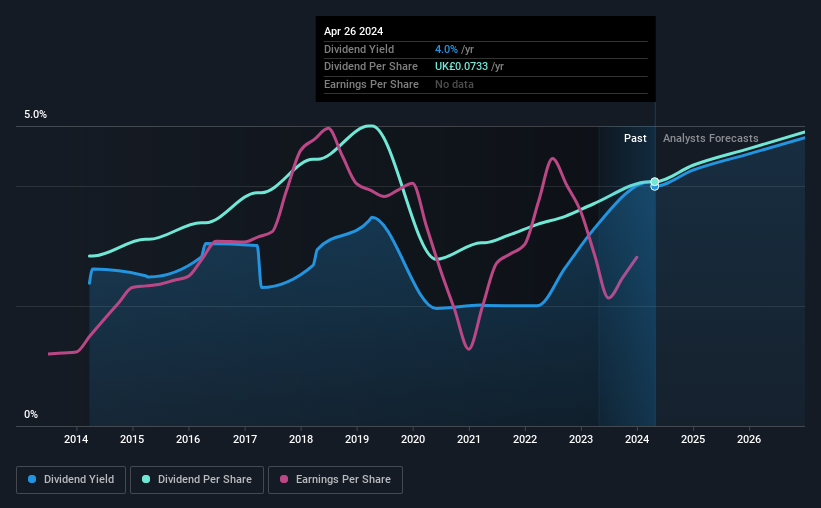Henry Boot (LON:BOOT) Is Increasing Its Dividend To £0.044
The board of Henry Boot PLC (LON:BOOT) has announced that it will be increasing its dividend by 10.0% on the 31st of May to £0.044, up from last year's comparable payment of £0.04. Based on this payment, the dividend yield for the company will be 4.0%, which is fairly typical for the industry.
See our latest analysis for Henry Boot
Henry Boot's Earnings Easily Cover The Distributions
We like to see a healthy dividend yield, but that is only helpful to us if the payment can continue. Based on the last payment, Henry Boot was earning enough to cover the dividend, but free cash flows weren't positive. We think that cash flows should take priority over earnings, so this is definitely a worry for the dividend going forward.
Looking forward, earnings per share is forecast to fall by 5.4% over the next year. If the dividend continues along recent trends, we estimate the payout ratio could be 40%, which we consider to be quite comfortable, with most of the company's earnings left over to grow the business in the future.
Dividend Volatility
The company's dividend history has been marked by instability, with at least one cut in the last 10 years. Since 2014, the dividend has gone from £0.051 total annually to £0.0733. This implies that the company grew its distributions at a yearly rate of about 3.7% over that duration. We're glad to see the dividend has risen, but with a limited rate of growth and fluctuations in the payments the total shareholder return may be limited.
Dividend Growth May Be Hard To Come By
Given that the dividend has been cut in the past, we need to check if earnings are growing and if that might lead to stronger dividends in the future. In the last five years, Henry Boot's earnings per share has shrunk at approximately 7.0% per annum. If the company is making less over time, it naturally follows that it will also have to pay out less in dividends.
The Dividend Could Prove To Be Unreliable
In summary, while it's always good to see the dividend being raised, we don't think Henry Boot's payments are rock solid. While Henry Boot is earning enough to cover the payments, the cash flows are lacking. Overall, we don't think this company has the makings of a good income stock.
Investors generally tend to favour companies with a consistent, stable dividend policy as opposed to those operating an irregular one. Meanwhile, despite the importance of dividend payments, they are not the only factors our readers should know when assessing a company. Taking the debate a bit further, we've identified 2 warning signs for Henry Boot that investors need to be conscious of moving forward. If you are a dividend investor, you might also want to look at our curated list of high yield dividend stocks.
Have feedback on this article? Concerned about the content? Get in touch with us directly. Alternatively, email editorial-team (at) simplywallst.com.
This article by Simply Wall St is general in nature. We provide commentary based on historical data and analyst forecasts only using an unbiased methodology and our articles are not intended to be financial advice. It does not constitute a recommendation to buy or sell any stock, and does not take account of your objectives, or your financial situation. We aim to bring you long-term focused analysis driven by fundamental data. Note that our analysis may not factor in the latest price-sensitive company announcements or qualitative material. Simply Wall St has no position in any stocks mentioned.

 Yahoo Finance
Yahoo Finance 
